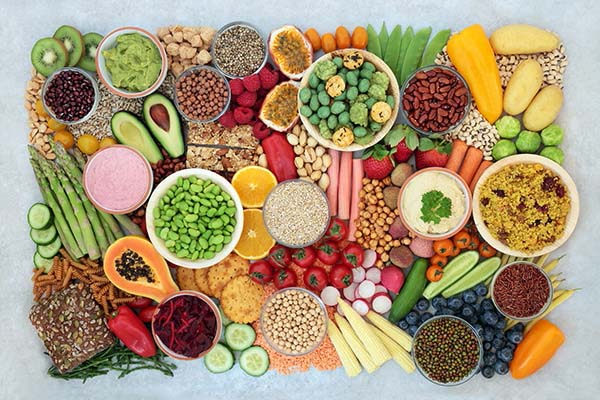Everything About Healthy And Balanced Food: Advantages of Taking On Plant Based Alternatives
The discussion surrounding plant-based diet regimens has obtained considerable attention in recent years. Several people are discovering the prospective health and wellness advantages, dietary benefits, and environmental impacts connected with these dietary choices. As people come to be a lot more knowledgeable about their food's impact on wellness and sustainability, concerns occur regarding the functionalities of adopting such a way of living. What details adjustments can one anticipate, and exactly how might these choices improve not only individual health and wellness but additionally the planet's future?
Understanding Plant-Based Diets
Lots of people link plant-based diet plans primarily with vegetarianism or veganism, these diet regimens can encompass a vast variety of eating patterns that focus on whole, minimally refined plant foods. Such diet plans usually consist of fruits, vegetables, entire grains, nuts, seeds, and vegetables, while limiting or removing animal items. This adaptability enables people to tailor their nutritional selections according to personal choices and nutritional requirements. Some might adopt a primarily plant-based diet regimen while still occasionally consuming meat or dairy products, often described as a flexitarian technique. The emphasis remains on integrating even more plant foods, which can cause a diverse range of dishes and tastes. Recognizing these various interpretations of plant-based consuming is crucial for appreciating its accessibility and appeal in contemporary food society.
Health And Wellness Perks of Plant-Based Foods
The wellness advantages of plant-based foods are substantial, providing a nutrient thickness benefit that sustains overall health. Study indicates that these foods can improve heart health and wellness and play a necessary duty in effective weight management. By integrating more plant-based alternatives, individuals may boost their dietary choices and promote long-term wellness.
Nutrient Density Benefit
Nutrient thickness plays an essential role in the health and wellness advantages of plant-based foods, making them an engaging option for those seeking a balanced diet. Plant-based foods, such as fruits, vegetables, legumes, nuts, and entire grains, are typically abundant in crucial vitamins, minerals, and anti-oxidants while being reduced in calories. This high nutrient density allows people to eat less calories while still satisfying their dietary requirements. Additionally, these foods are loaded with dietary fiber, promoting gastrointestinal health and wellness and aiding in weight administration. By integrating nutrient-dense plant-based choices, consumers can enhance their total health and wellness, support their body immune systems, and reduce the risk of chronic diseases. Eventually, the nutrient density of plant-based foods highlights their relevance in a health-conscious lifestyle.
Heart Health Renovation

Weight Administration Support
In enhancement to advertising heart health and wellness, a plant-based diet plan can considerably help in weight management. This nutritional technique emphasizes entire foods such as fruits, vegetables, legumes, nuts, and whole grains, which are generally reduced in calories and higher in fiber contrasted to animal-based products. The high fiber content helps raise satiation, minimizing overall calorie consumption. Additionally, plant-based diets are commonly rich in necessary nutrients while low in undesirable fats, making it less complicated to preserve a healthy and balanced weight. Gluten Free BBQ Sauce. Research study shows that individuals who take on a plant-based way of life often tend to have reduced body mass indexes (BMIs) and experience more effective weight management compared to those who take in meat-heavy diet regimens. As a result, welcoming plant-based options is a tactical option for efficient weight management
Nutritional Worth of Plant-Based Ingredients
Plant-based components are rich in crucial nutrients, providing a diverse variety of vitamins, minerals, and anti-oxidants that add to total health. A comparison of protein sources exposes that while pet products are often considered as premium, numerous plant-based options provide sufficient protein and other helpful compounds. Understanding the nutritional value of these active ingredients can help people make informed dietary selections.
Necessary Nutrients in Plants
Nutrient-rich active ingredients found in plants supply a varied variety of important minerals and vitamins that add considerably to general health official source and wellness. These components are rich in vitamins A, C, and K, which sustain immune feature, vision, and blood clot, specifically. Additionally, plants offer essential minerals such as potassium, calcium, and magnesium, important for heart health, muscle feature, and bone toughness. The presence of fiber in plant-based foods help digestion and advertises a healthy digestive tract microbiome. Antioxidants, found perfectly in vegetables and fruits, aid fight oxidative anxiety and reduce swelling. Moreover, many plant foods are reduced in calories yet high in nutrients, making them an outstanding choice for those looking for to keep a healthy weight while ensuring excellent nutrient intake.
Comparing Protein Resources
Protein resources vary significantly in their nutritional profiles, with plant-based ingredients providing distinct advantages. Unlike pet healthy proteins, which commonly have hydrogenated fats and cholesterol, plant healthy proteins have a tendency to be lower in these harmful elements. Legumes, nuts, seeds, and whole grains are rich in important amino acids, fiber, vitamins, and minerals. Lentils supply high healthy protein web content along with considerable iron and folate, while quinoa is a complete protein, offering all 9 vital amino acids. Additionally, plant-based healthy proteins are typically come with by antioxidants and phytochemicals that support general health. The shift to plant-based healthy protein sources not just improves nutritional consumption yet likewise aligns with lasting nutritional practices, reducing ecological influence and promoting long-term wellness benefits.
Ecological Impact of Plant-Based Eating
As awareness of climate modification expands, numerous people are discovering lasting dietary choices that can considerably minimize their environmental impact. Plant-based consuming has become a substantial factor to reducing greenhouse gas discharges, which are largely associated with livestock manufacturing. The cultivation of fruits, beans, grains, and veggies generally needs less sources, such as water and land, contrasted to pet farming. Additionally, plant-based diet plans can cause reduced logging, as much less land is required for grazing animals or expanding animal feed. By moving in the direction of plant-based alternatives, customers can support biodiversity and promote much healthier ecological communities. Overall, embracing plant-based eating not only benefits personal health however likewise stands for an important step toward environmental sustainability and conservation initiatives.
Conquering Common Misconceptions
While several people identify the advantages of a plant-based diet, a number of mistaken beliefs commonly hinder them from this article totally embracing this way of life. A typical belief is that plant-based diets do not have sufficient protein; however, numerous plant resources, such as beans, nuts, and tofu, check out here offer sufficient healthy protein. Additionally, some think that this diet plan is pricey, when as a matter of fact, staples like beans, rice, and seasonal veggies can be rather cost effective. One more mistaken belief is that plant-based consuming is overly restrictive, whereas it in fact uses a varied array of foods and flavors. Lastly, numerous worry that a plant-based diet might cause deficiencies, yet with correct preparation, people can obtain all essential nutrients, including nutrients, while appreciating a wide array of tasty meals.
Tips for Transitioning to a Plant-Based Way of living
Making the shift to a plant-based way of living can be an enriching experience, though it usually needs some advice to navigate the first changes. Initially, people are urged to start progressively, incorporating even more fruits, veggies, legumes, and entire grains into their meals while lowering meat and dairy products intake. Meal preparation is essential; preparing a weekly food selection can aid relieve the modification and protect against last-minute undesirable selections. Exploring cooking approaches and brand-new dishes can also maintain and enhance the experience enjoyment regarding plant-based eating. Additionally, signing up with support groups or neighborhoods can supply inspiration and share valuable suggestions. Lastly, remaining notified concerning nutrition assurances balanced meals, avoiding deficiencies while promoting a healthy, gratifying plant-based way of life.
Delicious Plant-Based Meal Ideas
Discovering delicious plant-based dish ideas can influence people to embrace an extra nourishing diet. One preferred option is a passionate quinoa salad, including cherry tomatoes, cucumber, and a zesty lemon-tahini dressing. An additional fave is a tasty lentil stew, loaded with carrots, celery, and fragrant herbs, perfect for a soothing supper. For breakfast, overnight oats made with almond milk, chia seeds, and topped with fresh berries supply a nourishing start to the day. Furthermore, a vivid vegetable stir-fry with tofu and a selection of vibrant veggies can be a fast yet pleasing dish. Luscious avocado salute on whole-grain bread, sprayed with seeds and seasonings, supplies a basic yet delicious treat. These dishes display the variety and splendor of plant-based consuming.

Frequently Asked Inquiries
Can a Plant-Based Diet Plan Offer Enough Healthy Protein?
The question of whether a plant-based diet regimen can offer adequate protein is usual. Many sources, consisting of vegetables, nuts, seeds, and whole grains, can fulfill protein requires successfully, supporting a nutritious and well balanced diet for people.
Are Plant-Based Diet Plans Suitable for Children?
The viability of plant-based diet plans for youngsters depends upon mindful preparation. Adequate nutrients need to be guaranteed, consisting of proteins, minerals, and vitamins. With proper guidance, such diet plans can sustain healthy development and development in children.
Just how Do I Eat in restaurants on a Plant-Based Diet regimen?
Eating out on a plant-based diet includes looking for restaurants with diverse food selections, requesting alterations, and exploring vegan-friendly choices. Preparation in advance and interacting nutritional choices can enhance the dining experience while keeping nutritional choices.
What Are Typical Irritants in Plant-Based Foods?
Common allergens in plant-based foods include soy, gluten, nuts, and seeds - Plant Based Chicken. People following a plant-based diet ought to understand these allergens and read tags carefully to prevent negative reactions and assure secure usage
Can Plant-Based Diets Assist With Weight-loss?
Research suggests that adopting a plant-based diet might assist in weight-loss due to its normally reduced calorie thickness and greater fiber material. This mix can enhance satiety, helping individuals handle their calorie intake successfully. Several individuals connect plant-based diet plans generally with vegetarianism or veganism, these diets can encompass a wide range of consuming patterns that focus on entire, minimally refined plant foods. Nutrient density plays a vital function in the health benefits of plant-based foods, making them an engaging selection for those looking for a well balanced diet regimen. Plant-based diet plans have actually been revealed to substantially boost heart health and wellness, as they commonly include elements that sustain cardiovascular function. In enhancement to promoting heart health and wellness, a plant-based diet plan can considerably assist in weight monitoring. A typical belief is that plant-based diet regimens do not have enough protein; nevertheless, many plant sources, such as beans, nuts, and tofu, supply sufficient healthy protein.